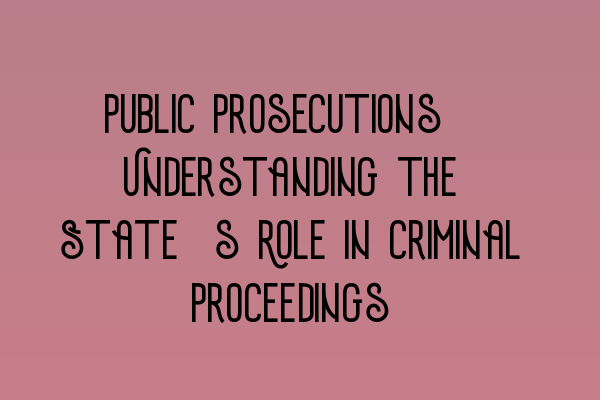Public Prosecutions: Understanding the State’s Role in Criminal Proceedings
When it comes to criminal proceedings, understanding the role of the state in public prosecutions is essential. The state, represented by the Crown Prosecution Service (CPS) in the UK, has the significant responsibility of bringing criminal charges against individuals who are accused of committing crimes. This blog post will delve into the various aspects of public prosecutions, the role of the CPS, and provide an insight into the criminal justice system.
The Crown Prosecution Service (CPS)
In the UK, the CPS is the main prosecuting authority responsible for conducting public prosecutions. Its primary function is to ensure that justice is served by carefully considering the evidence and deciding whether to prosecute individuals accused of committing criminal offenses. The CPS operates independently from the police and other investigative bodies, ensuring impartiality and fairness in the decision-making process.
When a crime is reported to the police, they will conduct initial investigations and gather evidence. If they believe there is enough evidence to proceed, the case is then referred to the CPS for further assessment. The CPS will review the evidence and determine whether there is a realistic prospect of conviction and if it is in the public interest to bring charges.
Should the CPS decide to proceed with a prosecution, they will represent the state in court and present the evidence against the accused. It is their duty to ensure that the case is presented fairly and that the defendant’s rights are respected throughout the proceedings. This includes disclosing all relevant evidence to the defense, enabling them to prepare their case effectively.
Objectives of Public Prosecutions
The primary objective of public prosecutions is to maintain public confidence in the criminal justice system. This means pursuing justice for victims, holding offenders accountable for their actions, and deterring others from engaging in criminal behavior. The CPS also aims to ensure that the legal process is fair, transparent, and respects the rights of all parties involved.
Additionally, public prosecutions play a vital role in upholding the rule of law. Through their actions, the state sends a clear message that criminal behavior will not be tolerated, and that those who break the law will face the consequences. This contributes to maintaining social order and protecting the welfare of the wider community.
Challenges and Decision-Making
The decision to prosecute an individual is a complex one, and the CPS faces several challenges in the process. They must carefully assess the evidence, considering its strength and reliability. They also consider factors such as the seriousness of the offense, the impact on the victim, any mitigating circumstances, and the likelihood of securing a conviction.
These decisions are made in accordance with the Code for Crown Prosecutors. The code sets out a two-stage test: the evidential stage and the public interest stage. The CPS will only proceed with a prosecution if both stages are satisfied. This ensures that only cases with sufficient evidence and public interest are pursued, preventing frivolous or malicious prosecutions.
It is important to note that public prosecutions are not infallible, and mistakes can occur. In such instances, it is the role of the defense to challenge the evidence and ensure a fair trial. Defense lawyers play a crucial part in the criminal justice system, protecting the rights of the accused and holding the prosecution accountable.
Conclusion
Understanding the state’s role in public prosecutions is crucial for anyone involved in or affected by criminal proceedings. The CPS plays a pivotal role in upholding justice, ensuring that individuals accused of committing crimes are held accountable. By maintaining fairness, transparency, and the rule of law, public prosecutions contribute to a just and orderly society.
For more information on criminal law, practice, and preparation for the SQE exams, check out our related articles:
